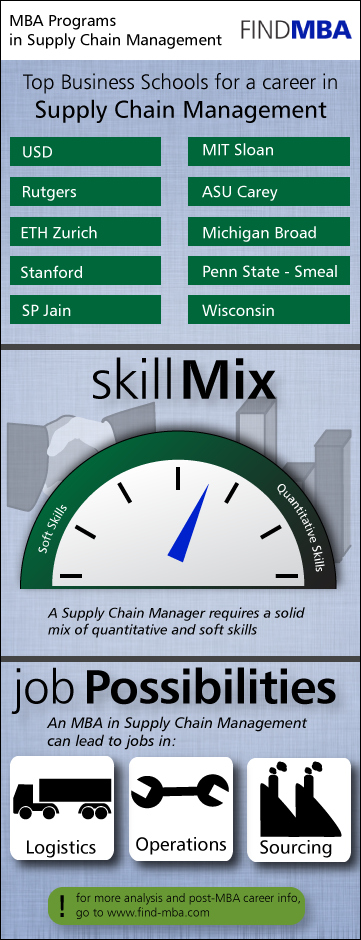Once upon a time, most organizations had a pretty rudimentary understanding of supply chain management.
“Twenty years ago, these operations roles were 'we need somebody to run this plant, go run the plant and don't screw up,'” says Doug Thomas, MBA faculty director at Pennsylvania State's Smeal College of Business.
But today, a host of emerging issues – like sustainability, globalization, and natural disasters – are increasing the visibility of supply chain managers.
Today's supply chain managers tend to deal with very modern issues. The 2011 earthquake in Japan, for example, made many organizations rethink their approach to risk management.
“Companies are thinking about how they design their supply chains better to mitigate these risks, and prevent themselves from being shut down by an earthquake or a hurricane,” says Kevin Linderman, who teaches supply chain at the University of Minnesota's Carlson School of Management.
Because of this, many MBA programs that focus on supply chain management are adding sustainability and risk management courses to curriculums that were previously focused on more traditional topics, like transportation logistics or strategic procurement.
Smeal's Doug Thomas says that because of these shifting needs and priorities, today's supply chain roles require people who can think on their feet. Supply chain managers, he says, “need a mix of analytic skills – there's data that needs to be analyzed and spreadsheets to do.”
“But you also need a lot of soft skills,” says Thomas, “because you're collaborating across functional areas where there might not be reporting authority, and there are lots of dotted lines in the org chart.”
 The dotted lines mean that supply chain roles are now highly integrated within organizations. On any given day, a supply chain manager might interact with their organization's finance, marketing, and information technology departments, in addition to outside suppliers or contractors.
The dotted lines mean that supply chain roles are now highly integrated within organizations. On any given day, a supply chain manager might interact with their organization's finance, marketing, and information technology departments, in addition to outside suppliers or contractors.
Because of this cross-department collaboration, many MBA programs in supply chain management cover a range of functional topics. Students in the supply chain management concentration at Arizona State University's W.P Carey School of Business, for example, are required to take courses in project management and logistics, but are also able to take electives in negotiations and new product development.
John Fowler, the school's chair of supply chain management, says that this provides a holistic overview that's necessary in today's organizations.
“You might do something on the operations side that makes things really efficient,” says Fowler, “but that may lead to inefficiencies somewhere else, because you have to carry more inventory later, or you have to ship larger amounts.”
Since many supply chain roles require interaction with people, MBA programs in this area can also help students improve their “soft skills,” such as leadership. Beyond courses in negotiation and leadership, some schools also offer internships or projects with organizations, where students can get real-world experience in supply chain roles. Minnesota Carlson offers students a chance to do a two-semester consulting project, where students can hone their soft skills. “Even if they're working in an analyst role, they learn that to analyze the data, they have to get that data from somebody and communicate about that data to somebody else,” says Carlson professor Kinshuk Sinha.
For many students, these hands-on experiences can prove to be engaging. According to ASU's John Fowler, students see that “while there is a lot of theory behind it, it can also be very practical, in the sense that people can understand what the problems are very quickly and get excited about that, and realize that there are things that can be done better.”
It's about the jobs
A main benefit of an MBA program in supply chain management is that the job market for trained supply chain managers is fairly large and varied. Fowler says that graduates of ASU's program go into a number of positions in supply, operations, or logistics; in industries that range from the energy sector to pharmaceuticals to defense.
Since supply chain roles are so deeply integrated within organizations, they also tend to be a good jumping off point for those with ambition.
“Supply chain roles tend to be good starting points, because you're visible throughout the organization and you get a lot of experience with collaborating across different functional groups,” says Smeal's Doug Thomas.
And beyond that, many students are realizing that supply chain roles line up with their interests. Karen Donohue, who teaches supply chain courses at Minnesota Carlson, sees that “students are asking for more on sustainability, because they're seeing that this is becoming a big deal” – and they're finding that more supply chain roles are integrating sustainability topics.
Donohue notes that while there might not be that many sustainability-specific supply chain roles yet, literacy in this area can be a good asset to bring to any supply chain role.
“There may not be a job right now that says 'sustainable supply chain analyst,' but sustainability tends to be something that permeates the job that you have,” says Donahue. “That's going to be very valuable to the firm, and this can be a place where a student can really shine.”
For a list of programs offering an MBA concentration in supply chain management, please seeFIND MBA's Supply Chain Management Specialization page.










